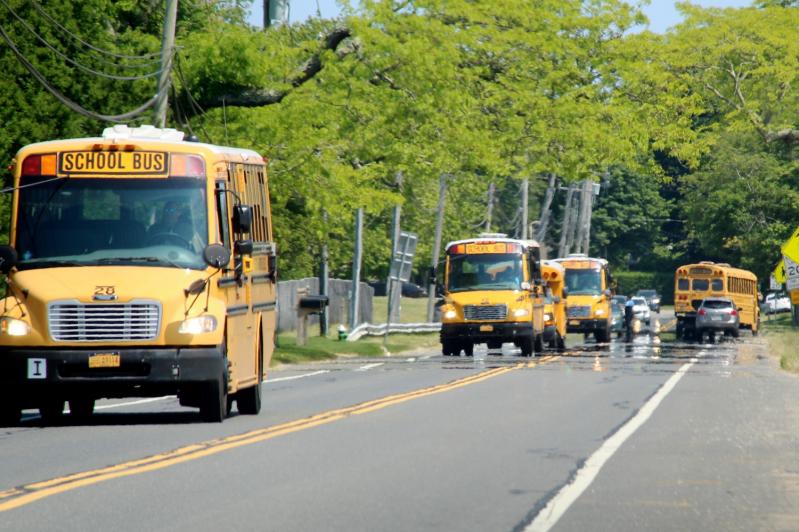The East Hampton School District has embarked on a study with a consultant on the feasibility of putting electric school buses into service beginning three years from now.
Starting in 2027, according to the website of the New York State Energy Research and Development Authority, all buses sold in New York must be zero-emissions electric vehicles. The state has also given school districts a mandate to replace their entire bus fleets with all-electric vehicles by 2035.
“This important transition will reduce emissions that can harm our kids’ health, pollute the air in our communities, and contribute to climate change,” the NYSERDA website says.
On Tuesday, the school board approved a contract with Wendel Energy Services, a limited liability company based in Hauppauge, to prepare for this change. The total cost of the study is $62,700, of which 75 percent, or $47,025, will be covered by NYSERDA under its Flex Technical Assistance in School Bus Fleet Electrification initiative.
“New York State is requiring us to contract with a company that can provide a feasibility study for electric buses out here,” Adam Fine, the district superintendent, said during Tuesday’s school board meeting. The state “does not just want to hear anecdotes about it. They want facts.”
Those facts, Mr. Fine said, will include the geographical realities of running a bus fleet in one of the easternmost school districts in the state.
And he has questions. Will the electrical grid support East Hampton’s fleet of 30 buses, not to mention those of its surrounding districts? Can buses charge enough after a morning route to complete the afternoon run? How can the district safely and efficiently transport students to field trips and sports games UpIsland, for which buses travel sometimes 35 miles or more each way for a single game? Will electric buses, which at present cost about four times more than diesel buses, become more affordable?
He and other local school officials recently got a chance to ride an electric bus.
“It had to be towed back to the people who let us try it,” Mr. Fine said.
He said he is “all for electric and supporting the environment. We’ve had students come to us and yell at us to get electric buses. . . . It’s more of the tech question — the infrastructure.”
Christina DeSanti, the board vice president, concurred. “Right now it’s not feasible on a practical level, even though we do support the concept of it.”
She pointed out that when the district began building its new transportation depot a few years ago, it took electric buses into consideration.
“We know it’s coming, but the infrastructure is just not there yet. . . . Five years from now, it might be a different story,” Ms. DeSanti said.
East Hampton also signed an agreement on Tuesday to hire a consultant to track its bus routes to make them more efficient, following a recommendation by its transportation director, Colette Furcht. The contract, with a New York City company named BusRight, is for about $52,500 each year for the next three years beginning this week.
“It basically allows bus routes to change, update . . . and communicate with drivers more effectively,” Mr. Fine said.
A third consulting contract approved on Tuesday will bring Susanne Pena, who is based in Florida but has also done work abroad, on board to help the district fine-tune its dual-language elementary school program and plan for its implementation into upper elementary school and middle school grades.
Tim Fromm, assistant superintendent for curriculum and instruction, called Ms. Pena “a good find. She’s known throughout the nation.”

